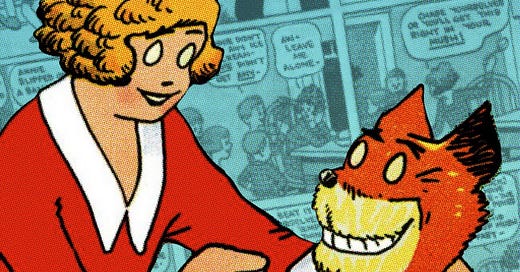Little Orphan Annie is 100 years old, and I'm sick of her!
An essay for Slate, and some other reads
On August 5—a day after my own birthday!—Little Orphan Annie turned 100. A creation of cartoonist Harold Gray, the spunky redheaded orphan first appeared in the New York Daily News on that date in 1924. Most of us now are far more familiar with the Annie musical and movies, but those versions of Annie owe a lot to Gray’s original comics, which introduced audiences to this beloved, resilient, and parentless character. A century later, we still can’t stop telling her story and remixing it—Annie derivatives appear to be in endless supply.
I write a lot about Annie in my book The Sun Won’t Come Out Tomorrow, and I knew I couldn’t miss the opportunity to mark her 100th birthday with an essay. But for publicity purposes, it was important that I write something quite different than the Annie chapter in my book. The result is this essay for Slate, where I use the political parlance of the summer to zero in on how Annie is plain weird and point out how weird it is that we still love her so much. I also get into why it matters that we’re addicted to this tale of perseverance and grit. I’d love if you would read it.
In other book news, I recently finished marking up page proofs and making final tweaks to the text before it goes off to print later this fall. No one tells you how many times you will have to read your own book before it comes out, but let me just say it is many, many times and it is more work than you might think! Not to toot my own horn too much, but I still think the book is interesting after all those reads, and kind of can’t believe how much research I did to make it happen. If you’re so inclined, you can preorder from various book purveyors here (I recommend Bookshop, which supports indie bookstores) so you can be sure to receive it on January 21. And if you’re a critic or bookish influencer and you’re interested in covering the book, please reach out—ARCs are available!
And now for some reading recs!
I was thrilled to see this in-depth profile of Michael Oher in the New York Times Magazine this weekend (gift link). I’ve been waiting for a story like this since last summer, when news broke that Oher—the subject of the book and movie The Blind Side—had filed a lawsuit against his alleged adoptive parents LeAnn and Sean Tuohy, wealthy white folks who never actually legally adopted him but have profited off a gross simplification and misrepresentation of his life story. Back when my book was just a proposal, I wrote that The Blind Side represents the apotheosis of the white savior narrative we choose to buy into about foster care. The unraveling of that white savior narrative only furthers my belief that this is the case!
And in more niche news, the upEND Movement—one of the organizations doing phenomenal work around imagining and creating better systems for supporting children, families, and communities and abolishing family policing—has just launched a really exciting series called “Reclaiming Safety.” Here’s a bit from their intro:
Calls to abolish the family policing system are often met with questions concerning the “What about…?” What about children who are seriously abused? What about children in homes with substance use? These questions, though at times well-intentioned, suggest the system is the only mechanism through which harm can be addressed. The reflexive impulse toward punishment is deeply ingrained in our consciousness, making it difficult for many to envision a society without institutions like “child protective services” and “foster care,” even while recognizing that the family policing system perpetuates racism, inequality, and violence across generations.
I can’t wait to read more from this series!
That’s about all for now—thanks for reading!




